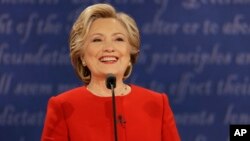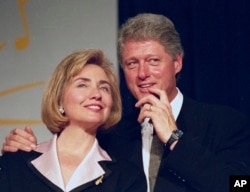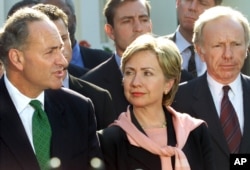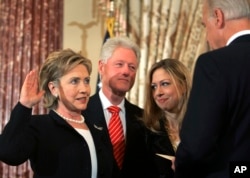If Democratic presidential candidate Hillary Clinton were elected, would she be more like she was as first lady during her husband Bill Clinton’s presidency or more like the U.S. senator from New York she was from 2001 to 2009?
Clinton has a wealth of political experience to draw on if she is elected, including her tenure as secretary of state under President Barack Obama. How she does that will affect how she governs and how she is perceived by the American public.
“If, as president, Clinton is more like she was as first lady, it’s going to be problematic for her. If she’s more like she was as senator, she’ll find much more success,” said John Hudak, senior fellow in governance studies at the Brookings Institution.
First lady Clinton
Clinton opted to be a more active first lady than many of her predecessors, choosing to tackle policy issues like health care reform. But her 1,000-page bill went to defeat in Congress in 1993 and opened her up to criticism both for its complexity and her role, as the president's wife, in drafting it. Her approval rating dropped by almost 20 points.
Clinton's approval rebounded in 1998 when she became a fierce defender of her husband during the scandal over his affair with Monica Lewinsky.
“There’s always been that side of Hillary Clinton who has looked with suspicion towards the news media and has been quite combative and that sometimes contrasts with the public image that Clinton likes to present,” said Michael Isikoff, a journalist who first uncovered the news of Lewinisky affair.
Isikoff said Clinton is still on her guard with the press even now.
“While she gives TV interviews,” Isikoff said, “she doesn’t give press conferences where reporters can ask anything they want and are likely to badger her with questions she doesn’t want to spend a lot of time answering.”
That reluctance to speak with media – combined with self-acknowledged weaknesses as a politician – can make Clinton look like a weak candidate.
But when it comes to Hillary Clinton, the important thing to remember is that campaigning is not the same as governing, said Indira Lakshmanan, a contributor to Politico, who covered Clinton’s 2008 presidential run and her time as secretary of state.
“She’s much better when she’s actually in office, and you see it even in just her body language and her behavior,” Lakshmanan said. “She was much more relaxed around her own staff, around the press, just more relaxed and comfortable when she actually was in office.”
Senator Clinton
If she is elected as the first female president of the United States, Clinton is expected to continue the work of her predecessor, the first African-American president.
“We know that she has more hawkish tendencies. She is more of a traditional Cold War, realist Democrat,” said Lakshmanan. “But I think she would double down on health care and she would perhaps try to do more interventionist – for humanitarian reasons – foreign policy than the Obama administration has been willing to do."
A key difference between Clinton and Obama could come in their approaches to Congress. President Obama was not known for his ability to build bridges with lawmakers on Capitol Hill, but Clinton’s experience in the Senate could be valuable as she builds a policy agenda for her first 100 days.
“If it’s controlled by Republicans, she’s going to have to veto an Obamacare repeal. She’s going to have to deal with all of the things President Obama has had to deal with coming from Congress,” said Hudak.
Clinton could draw on her pragmatic side to deal with that challenge and “extend an olive branch and say, ‘Listen, I’m not going to try to pass dramatic tax reform or an extension of Obamacare or something I know you’re going to hate. I want to get things done, and I want you to help me,’” he said.
Clinton would do well to recall her time as a U.S. senator when “she was actually working hard in a wonkish fashion behind the scenes and working on bipartisan legislation,” Lakshmanan said.
Political lessons learned
To run an effective administration, Clinton would also need to apply the lessons learned from her first presidential run and time as secretary of state.
“We saw in 2008, and at the State Department, an inability to run a big operation in a 21st century way,” said Fournier. “The best argument she has on the email fiasco is, 'Well, we didn’t know what the rules are.' That’s not a very good thing.” Fournier also cites the much-discussed Benghazi embassy attack, saying the controversy considered even under the most favorable light for Clinton still raises questions about her management style and credibility.
Fournier – who has known and covered Clinton since her time in Arkansas in the 1980s – said he has always found her very warm and engaging on a personal level and admired her approach to problems:
“She thinks like a lawyer, ‘Here’s what we got to get done. Boom-boom, get it done. Think it through; work it through.’”







